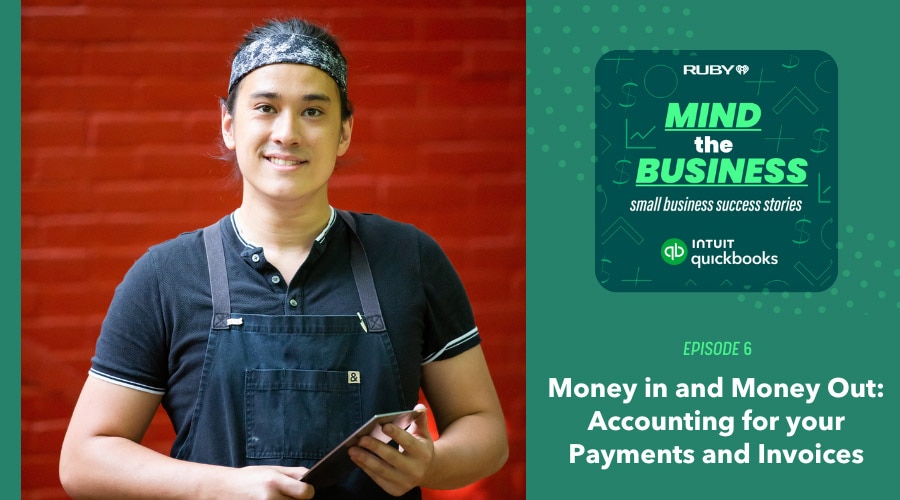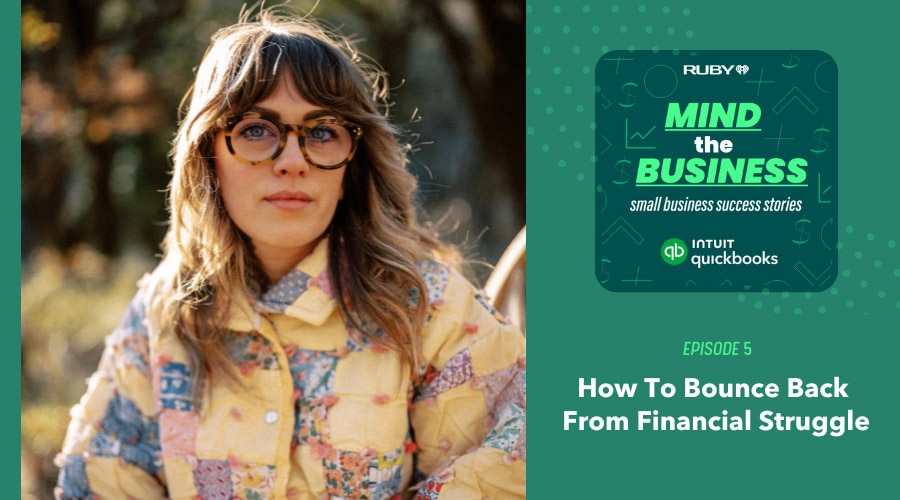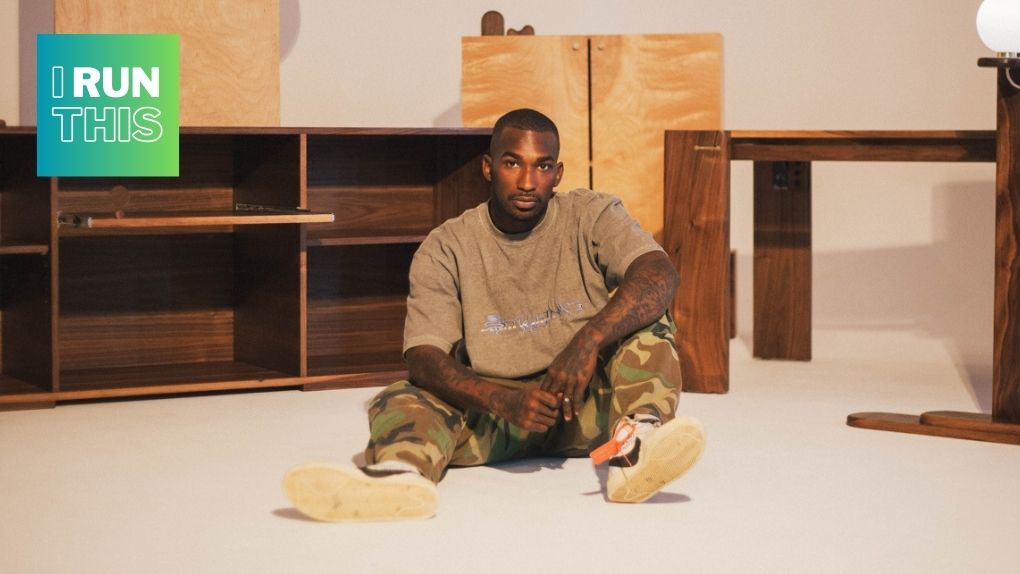Owning a small business can be one of the most rewarding and challenging things a person does. Amid an uncertain economy and ever-evolving consumer trends, there is a lot to figure out and navigate to ensure your business thrives. Join hosts Jannese Torres (Yo Quiero Dinero) and Austin Hankwitz (Rate of Return) as they connect with small business owners and hear their stories about managing the ups and downs of starting and growing a small business. Listen and learn valuable lessons from their experiences that will guide you along the way through your own small business journey.

Money in and money out: Accounting for payments and invoices
Michael Behn is an edgesmith who uses traditional Japanese techniques to perfectly sharpen blades. Everything from cooking knives to ceremonial kirpans to simple pocket knives. After working for nearly ten years in the restaurant industry, he founded Moshi Moshi Knife Sharpening, which provides high quality knife sharpening to over 2, 500 clients. In addition to starting and running his own company, he franchises out his business to other former kitchen workers who he trains in the art of knife sharpening. Michael is passionate about providing impeccable service to his customers as well as having a healthy work/life balance.
Jannese Torres: Michael, let's start with the name of your business. Moshi Moshi. What is the story behind it?
Michael Behn: “Moshi moshi” is an informal and very friendly way that Japanese people greet each other on the telephone. So they'll just pick up the phone and go, “Hi, moshi moshi.” And I just thought it would be like a cute thing to do. You know, when I was sort of dreaming of the business as a line cook, just imagining me being super enthusiastic, picking up the phone: “Hi, moshi moshi.” And I always thought that would be fun.
JT: So you started working in restaurants when you were a teenager, but then you found yourself at the age of 24 working in a chaotic, fast-paced kitchen in charge of 15 people. What was the moment that made you realize you wanted to make a change from working in a fast- paced kitchen and branching out into your own business?
Michael: The moment was the pandemic. It started when I was 24 as a sous chef, and it started the ball rolling of doubt for the kitchen game. During the pandemic my hours kept going up, my pay kept going down, and the treatment of myself as a human being was just not very nice.
JT: Yeah, I think a lot of people had that reckoning moment during the pandemic where they started to question like…is this something I still want to keep doing? And I think the restaurant industry definitely has a reputation for being a place where you need to have a very thick skin. So I understand why you'd want to make that transition. Now you did say that one of the ways that you learned how to sharpen knives was through trial and error, which I think most people can relate to, especially in entrepreneurship. Would you say that's true about how you started your own company?
Michael: I would absolutely say trial and error has been the main teacher through this and everything. There's no other knife sharpener who can just take you under their wing and show you all the mistakes they made. You kind of have to make the mistakes first and then hope it's not so bad. And then just go on from there.
JT: How do you actually learn how to do this stuff?
Michael: Well, I just got back from a big trip to San Francisco where I went to an established knife shop and worked with them for a few hours just to learn a couple techniques I was really trying to refine. The last 3 to 5 percent of my technique is just learning what the tiny thing is that they do differently compared to me, and then working that into the routine.
JT: That's fantastic. I think that a big part of this whole journey as a solopreneur is just understanding that there's always going to be opportunities to improve and to learn and to not be afraid of putting yourself out there and looking for those opportunities wherever you can get them.
Michael: Exactly, and that's the biggest thing for me because, of course, doubt rolls in at times when I'm just by myself sharpening 200 knives a day and I'm just cutting paper on Instagram and I'm like, is this working? What am I doing with my life? Of course, doubt comes up, but like, I just got to trust the process, if you will.
Austin Hankwitz: I was talking with Candice Nelson, the founder of Sprinkle Cupcakes, recently. And she told me this story, which I think might resonate with you, Michael. Back in the early days of Sprinkle Cupcakes, she wanted to go out and hire the big consultants and the industry veterans and the people who were supposed to have the answers.But once she hired those people, she realized — wait a second — we're doing things so differently here at Sprinkles Cupcakes that their answers don't even resonate. So I feel like as a solopreneur who's trying to figure this out and carve your own path in solopreneurship with your knife sharpening business, that maybe it's an even better idea not to take too much inspiration from the industry veterans and have that self reflection and say, “How can I best serve my customers? How can I best create processes in my business for efficiency and an awesome customer experience?” It seems like that’s something you've done a very good job of.
So, staying on top of money coming in and going out and tracking all the paperwork with it can be so challenging for small business owners who are also having to wear all the other hats to keep the company going. So how do you keep track of all that?
Michael: Well, my wife has been an accountant her entire professional career. So she was like, “Let's get QuickBooks.” She's like the financial brain of the entire operation, which is so nice and amazing for me because it's tough for me and it's just really nice having somebody who specializes in the numbers aspect.
AH: I think we hear that a lot from solopreneurs. You want to play to your strengths and hire to your weaknesses. And lucky for all of us, we can all hire QuickBooks if you're not that great at keeping tabs on the finances.
Michael: Having everything out in front of me and being able to see it is pretty nice.
Michael: The thing with knife sharpening is that the expenses are pretty low to keep it running. Like I bought one expensive big grinding wheel and it's lasted me almost two years now. You know, so it's like, I'm not spending money actively every day to keep the business rolling. It's almost like one big expense every couple of months. So it's really nice seeing everything in one place. And it really helps me with the unknown anxiety.
JT: So Michael, you mentioned that a big part of your business is folks actually coming and dropping off their knives to your home in order to get them sharpened. Does that mean you're taking payments at the time of service? And then how are you actually tracking those?
Michael: Yeah, it's very simple right now in that people drop the knives off and then when they pick them up after the service has been rendered and they've been quoted, and then they pay me either through cash or card. Right now I'm taking payments through Square. So it's pretty nice that I get a big weekly report from Square and I can get the monthly and yearly report, and then it's all there — it's easily imported into QuickBooks and all that. And then, you know, I think it's important to report all your cash too. The benefits of having reportable income outweighs, you know, not paying the taxman.
JT: Absolutely. I mean, if your business is way more profitable than you're showing on paper, it's going to be a lot harder for you to get loans and be able to expand or get that brick and mortar. So I'm glad that you mentioned how important it is to even track those cash payments. Let's talk about how you actually organize your finances, because obviously it's great for us entrepreneurs to see that money coming in. But what are some strategies for where you actually put your money? Do you have different bank accounts? Do you use it to reinvest in the business? Are you planning for your own retirement? Take us behind the scenes.
Michael: Definitely. I started retirement savings at 29. That's been really nice having a net worth. It's like my new hobby right now is compounding money. It's just like, there's going to be some commas in here someday. And it's really nice doing that. I felt like at the beginning I was wasting my money, but now I only want to put it in there. So I've been really going crazy on the Roth. Love the Roth.
JT: That's something that only a true money nerd can say.
Michael: And I'm trying to do other stuff because, again, my wife, Jenna, is an absolute superstar. She's all up in the finances. And I kind of feel like she's in a whole other world when she's doing her stuff. She's like investing in art and stuff. So, you know, trying to do the most, trying to max it out every year, because why not? That's the best thing I could do for building wealth.
JT: I love to hear that you're investing in retirement. Because I think it's very easy for folks who are used to regular paychecks to understand why that's important. But I would argue that as an entrepreneur, it's even more important that you think about what that exit strategy is going to be for you, whether that's retiring from your business to go start another one or just wanting to kind of ride off into the sunset. So it's really good to hear that you're thinking about what that long term plan is and not just getting bogged down with the daily numbers of the business.
Michael: Exactly. And just recently, for the first time in my life, I've got an emergency fund just chilling in a high yield saving account. So the amount of stress I'm not feeling has been so nice. But I don't want to be actively sharpening knives for the next 30 years. I do feel like it's not easy on the body and the brain and all that stuff. You know, you're grinding steel. It's not an easy job. But like, I met a guy with a very, very, very established knife company nationwide. And he sold his company for $156 million. And I was like, that's what I want to do! Let's do that.! So like, if someone's trying to buy Moshi in a few years, let's do it. And I shall ride off into the sunset.
JT: Who knew there was so much money in knife sharpening? This is all new to me.
Michael: I know. My jaw dropped. My priorities shifted very quickly once he told me that. I was like, okay, this person in the flesh has done it. It took generations to get there, but wow.
AH: You mentioned that you really enjoy a healthy work/life balance. It's really important to you. So especially now after spending nearly ten years working non-stop in these kitchens, talk to me about how you finally found that line between working hard to deliver something incredible, but not really overdoing it.
Michael: It’s a lot easier to work super, super hard when all the money is coming to me, right? It's not like four percent of the owner's paycheck going to one employee, right? There's actual fiscal motivation there. But really establishing a work/life balance is…I have a hard stop at six and, you know, sometimes I'll start at one, sometimes I'll start at two. I really cannot work that hard. There's an actual limit of knives I can do a week that's healthy for my body. Once the wrist starts feeling a little bit sore, I'm like, “Okay, I need to start thinking about taking a break.”
AH: Good for you. That's incredible. So talk to me about some precautions you take. How are you keeping your body in shape while sharpening steel?
Michael: Definitely. Safety is the number one priority, but luckily with my methods, it's all slow grinding. It's all water-cooled. There's no risk of getting hurt that way. The biggest thing for me is I have those giant pads that you stand on for your back. I got nice Birkenstocks. I've had this pair for like eight years now that I used in the kitchen too. Awesome for your back. And then of course I have my little wrist routine that I do every day. Before I start, I might do a couple of squats here and there just to activate the legs because it is physical. So it's just good to activate the body a tiny bit before you start. But the wrist routine is essential.
AH: So you mentioned that you maybe didn't enjoy working in a kitchen — you weren't really in love with it. But was there anything you miss about working in a restaurant every day, perhaps seeing all the people come in and out and maybe the conversations?
Michael: Yeah, so the thing with cooking professionally and in restaurants…I think the job of cooking is amazing. You can find people who are so young and so driven and pushing so hard for something… you know, it's not monetary. They're not making money for something that's just like to a higher degree of what they are, right? That type of personality type is so rare. You don't see it in other places. That type of selflessness and the drive. It's really astonishing. And I really do miss that. I miss being in an environment of collaboration and creativity where everybody is just so into it. I mean, damn, the last restaurant I worked at, we'd get there at 8:30 a.m or 9 a.m., and then it’s 2 a.m. and we all still have smiles on our faces. We’re tired, but we're smiling, we're joking around, and we're just getting ready for the next shift in six hours.
AH: That's awesome. So Michael, you're working in the kitchen, you're hanging out with Usher and Ludacris. Were you also sharpening knives while you were doing all your work in the kitchen? Was this like a side hustle for you in the beginning which turned into a full-time career? Or is this something that after you kind of pivoted away from your career working in the kitchen, you're like, “I'm so good at this, I'm ready to do it full-time.”
Michael: I definitely always thought about it and I was always talking to my people in the kitchen about doing a knife sharpening business. Everybody was like, “Oh yeah, do it, do it, do it.” But I had just started cooking. I just cut my thumb off at the Mexican restaurant I was working at. It was gross. It was a bad one. But what I remember everybody saying — my chef was like, “You shouldn't have been able to do that. Your knives are very sharp, at least.” I got into the kitchen through the knives. I remember watching a very specific YouTube video of extreme knife skills. And I remember watching that and being mesmerized. I was in college — not loving it — but just watching this dude in the kitchen cutting stuff and I was like, “Okay, I'm just going to do that.” From the start, I was always into knife sharpening, and I always had the sharpest knife in the kitchen.
It was never really something that I made money with when I was working in kitchens. I didn't have any time to do that as a side. But it was always something that was in my head since day one. And a once in a lifetime pandemic got me there.
JT: Tell us what's next for Moshi Moshi and for you. Well, I
Michael: I'm pushing towards trying to get a small brick and mortar. It doesn't have to be a retail shop yet. It just needs to be 200 to 400 square feet of me in a room that's not my house with professional grade equipment, so that I can really push and get more knives done to a higher quality. I think I've done enough research to quell the imposter syndrome, which is big. The next step is just coming around. Asking investors to potentially pay for this little knife shop thing.
JT: Yeah, that's awesome. And this is again, why it's so important for you to know your numbers as a solopreneur, because when you know how much money you're making, you know how much profit you have, and you can use it to reinvest in the business and take it to the next level.
Michael: Exactly. And I'm super grateful that I have somebody who is so financially — their brain just works perfectly for it. Thank you to my lovely wife.
This podcast is a production of iHeartRadio and Intuit QuickBooks. Our executive producer is Molly Sosha, our supervising producer is Nakia Swinton, and our writer is Eric Leeja. Our head of post production is James Foster. QuickBooks Money is a stand alone Intuit offering. Banking services provided by Green Dot Bank, member FDIC. Only funds in envelopes earn annual percentage yield. APY can change at any time. Money Movement Services provided by Intuit Payments, Inc., licensed as a money transmitter by the New York State Department of Financial Services.










